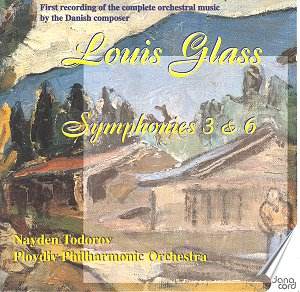Louis GLASS (1864-1936)
Symphony No. 3 (1901)
Symphony No. 6 Skjoldungeæt (1924)
 Plovdiv PO/Nayden Todorov
Plovdiv PO/Nayden Todorov
rec Plovdiv, June 2000
 DANACORD DACOCD542
[72.25]
DANACORD DACOCD542
[72.25]

As readers who are familiar with my earlier reviews will know I rate Louis
Glass very highly indeed. [
symphony
4 symphony 5
quartets
2&4 ] With a sweeping masterwork in the shape of the Symphony
No. 5 Sinfonia Svastika (1919) and a light Brucknerian sylvan Symphony
as well as a sprawling and generous Fourth we would do well to listen carefully
to Glass.
Mogens Wenzel Andreasen's notes are indispensable in their compact and unwordy
provision of context. He reminds us of Glass's Theosophical leanings (Mme
Blavatsky's influence was quite wide-ranging despite being repeatedly debunked
by investigators) are mentioned. This naturally recalls the similar inclinations
of Scriabin and Cyril Scott. His sympathy for Stravinsky's Rite of Spring
is apparently reflected in his music for the erotic ballet Artemis
(which I hope will be included in the Danacord series). However there is
no trace of Stravinsky in the Third Symphony rather the influences are Schuman,
Bruckner (unmistakable references to Bruckner's Romantic in the opening
bars and again in the finale) and Grieg (especially the Gynt music).
This is music of pastoral charm rather than symphonic torment or delight.
Both Ted Downes (in Manchester) and Alf Sjoen in Aalborg have had a shot
at The Woodland or as it is called here 'Wood Symphony'. The orchestra
here is attentive and committed but a shade careful. The sound is a mite
recessed with no monkeying around with perspective. The theme in the first
and final movements is obstinately memorable (be warned) and whistleable.
Was it, I wonder, the inspiration for Korngold's swooping theme for the film
Anthony Adverse?
After the exaltation and exultation of the Fifth Symphony in 1919 it was
another five years before Glass tackled the Sixth Symphony. The Sixth has
previously been commercially recorded on Marco Polo but a Danish Radio broadcast
by Karol Stryja (he of Marco Polo's Szymanowski series) is also circulating.
The work is quite different from the Fifth. Glass himself traced its family
tree back to Heise, Gade and Lange-Müller as well as the two titled
symphonies by J.P.E. Hartmann. This is more folk-Danish than Nordic Lights
romantic. The first (of five) movement is a quirky sostenuto - allegro
héroïque; being neither specially heroic nor happy. In fact
it is more sostenuto than allegro. Glass paints in autumnal
shadows, foreboding, strenuous and overhung consistent with Nordic legendary
poem linked with the title (The Birth of the Scyldings). While the
Fifth for all its 1919 vintage smacked of ecstatic abandon rather than Great
War tragedy the Sixth (first movement) is shot through with grimmer fibre.
The last three movements have the character traits (Delius, Elgar
and Griegian dances) and some of the detail of No. 5 but without quite its
conviction and passionate delivery. Ensemble could have benefited from being
tighter (try 5.23 et seq in track 5). A greater familiarity with the score
would have helped. The case is not helped by music that, to be brutal, lacks
the outright inspiration of the previous three symphonies.
This disc is generously filled and if one symphony (no. 6) misses the mark
it is not short of lower key charm. The Third Symphony is the stronger, more
idiomatically performed and well worth having. A Glass tune is something
to be cherished and you are unlikely to be disappointed with No. 3.
Rob Barnett

NOTE
Danacord's Jesper Buhl (to whom I am grateful for his generous co-operation)
confirms the intention to record 'the complete orchestral music' of Louis
Glass including the controversial ballet Artemis provided the score
and parts can be found. It was their idea to record everything Glass wrote
for orchestra but all depends on sponsorship. The next CD will be Symphony
no 2 and the Fantasy for piano and orchestra (DACOCD 453). The CD could be
ready very soon. No. 2 is quite unknown as also is No. 1 There is enough
music for at least 12 CDs if you take ALL the Glass orchestral works. The
problem is to find the material. Danacord have located a concerto for oboe,
but only the orchestral parts, no full score and no solo part! Rather
frustrating! RB
If in difficulty by all means contact the UK distributors:
Discovery Records Ltd
discovery.records@virgin.net
phone 01672 563931
fax 01672 563934
or Danacord via their website at
www.danacord.dk

